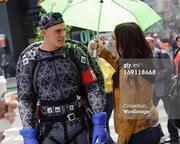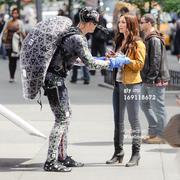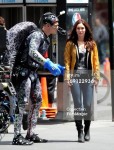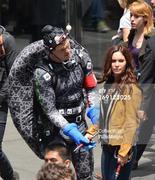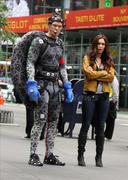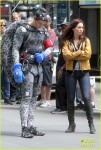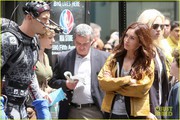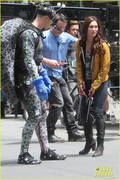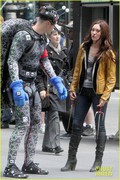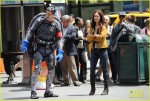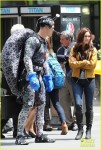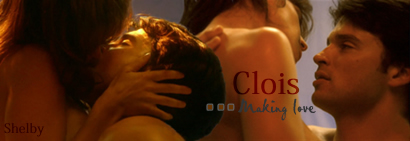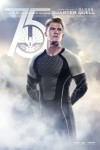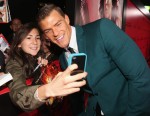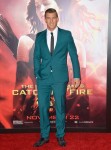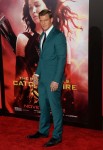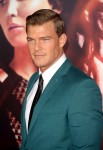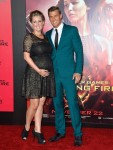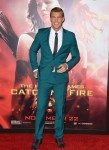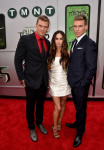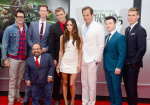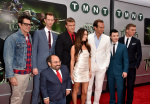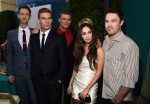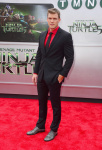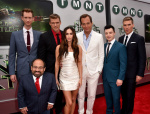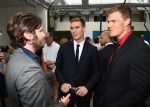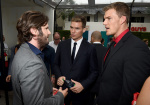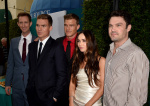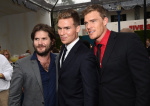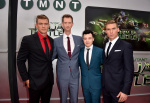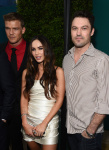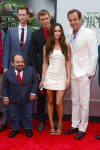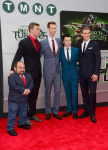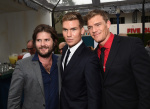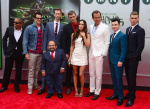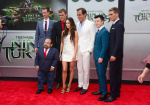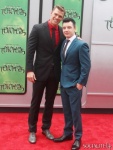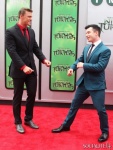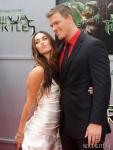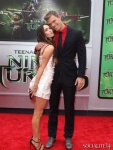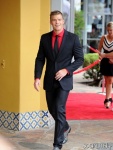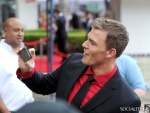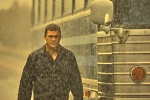Alan Ritchson sobre “Catching Fire,” “Ninja Turtles,” la Fama y la Privacidad
Por Jim Halterman | 21 Noviembre, 2013
It was just two short years ago when we sat down with Ritchson, then a regular on Spike’s Blue Mountain State, for a chat and photo shoot and the conversation went from whether his Blue Mountain State character – frat boy Thad Castle – was gay to playing Aquaman on TV’s Smallville to the handsome actor’s aspirations beyond being known for his early modeling days. Fast forward two years and Ritchson is definitely moving into the next phase of his promising career with a juicy part in one of the biggest holiday films this season, the Hunger Games sequel, Catching Fire.
In the film, which stars Josh Hutcherson, Jennifer Lawrence, Liam Hemsworth, Woody Harrelson, Lenny Kravitz, Elizabeth Banks, Toby Jones and Stanley Tucci, Ritchson plays Gloss, a male District 1 tribute in the 75th Hunger Games.
Catching Fire isn’t the only big name franchise Ritchson is a part of. Next summer, we’ll see him as Raphael in the new reboot of Teenage Mutant Ninja Turtles films.
TheBacklot sat down with Ritchson last week to catch up on everything in the past two years, his roles in both big films and the challenges in navigating the public’s perception of him as fame, publicity and the almighty internet grow bigger and more powerful.
TheBacklot: Congratulations on everything that’s happening right now. Was there a conscious transition going from TV to film or was it more happenstance?
Alan Ritchson: I wouldn’t say it was happenstance. There was a definite conversation that we had that was like, ‘are we going to stick to this?’ I’ve always had that desire. I think, as many actors do, to make that transition into the film world.
I think we could have quite easily stayed in TV. And it was a conversation. Do we stay in TV and try and get a show that has a broader fan base, where we can reach more people [and] build a bigger name and brand and then branch out? Or, do we take the risk and go now? And within two weeks of leaving Blue Mountain State all these great opportunities came in TV , making it a really hard decision. I ended up going with the show Super Fun Night [created and starring Rebel Wilson] on CBS.
TBL: Which changed a lot going from CBS to where it is now at ABC…
AR: It changed a lot. Yes and I think it definitely worked out the way that it was meant to because it didn’t get picked up at CBS. ABC later picked it up and sort of rebranded it a bit, and while that transition was happening, Hunger Games came along. And this was something that we really went for. Yes, the timing of it was just kind of perfect.
We’d worked really hard on Hunger Games and going for that and knew that if we got that, it would be the right time to stop doing TV.
TBL: From where I sit, I would call getting Catching Fire a game changer for your career. Is that how you see it?
AR: Yes. However, whatever capacity I’m involved in this [film], it’s so big that it takes everybody with it. I don’t think that I quite realized that even after doing the big PR tour and traveling and meeting everybody. There’s definitely a frenzy and a hunger for it, no pun intended.
TBL: With both of these roles, how do you approach them since you have source material in the Hunger Games books and the Ninja Turtles show, past films, comics, etc.?
AR: That’s a good question. I think as an actor the school of thought that I come from, is very much absorb every bit of source material that you can. Get as close to the author as you can and their intention and their idea. That’s a very important thing for me as an actor.
With Hunger Games, obviously it’s very easy to do. I was already a fan of the books before the first film was ever shot. [Nina Jacobson, Producer] did such a great job of painting the picture of this world and these characters, their dilemmas. It wasn’t a lot of work for me to do. I mean, it was a challenge to bring the character alive, especially Gloss from District One is in a grey zone. A little bit different from like Katniss, who is way out in District Twelve who has no allegiance to Capital.
There is some interesting inner conflict creating that kind of humanity in a character that really was created to be a villain. It was a challenge, but I went straight to the source material and stayed true to that. I think Francis Lawrence [Catching Fire Director] and everybody involved has – even more than the first picture – stayed very true to the novel, which I think is a good thing.
TBL: What about with Teenage Mutant Ninja Turtles?
AR: I actually didn’t read any of the comic books– and I really hope I don’t offend anyone saying that– but for me, I think we all know who Raphael is. He’s known as the angry hothead of the group. He is quick tempered and is quick to act. He is less thoughtful of people’s feelings and emotions and consequences. That’s something I can relate to as a person. I am very quick to act, like, ‘okay, decision’s made, let’s go for it.’
So I can relate to him in that sense, but I think just zoning in on who that guy is and then understanding the back story… how these guys were formed in the context of our story and where they came from, and the feelings of abandonment or betrayal. All those very real human feelings are something that are contained within that world, and I think we did a good job of creating a setting and a foundation for that.
So I had everything that I needed to create that character there. So I didn’t actually rely so heavily on somebody else’s perspective of Raphael twenty years ago, which to be honest like many of the cartoons like, this dude is smiling a lot. You know, they all look the same and there is so a much greater level of like, individual personality in this new reboot, you know that we haven’t seen before. So there wasn’t a lot for me to relate to, but I don’t know if people will understand where I am coming from, maybe until they see it, I don’t know.
I think as far as Ninja Turtles, I played a comic book hero [Aquaman] before, so I had some experience with trying to bring a character like that to life. It’s challenging because a comic book can span decades and there is an infinite number of authors to go to. The source material changes and these characters’ identities change. We still see it every day, like Superman is gay now in comic book nine hundred and eighty one, it’s like ‘okay well, that’s different then than the guy that started out in number one.’
TBL: Have you kind of gotten a sense with these big projects that people really want to know more about your personal life?
AR: Yes and I haven’t gotten used to that, maybe because on a personal level I tend to not want to know about people, their private life outside of their career, whatever it is. I think that’s maybe because I know what that’s like and I don’t want to put out in the universe that energy of [being] invasive because I don’t want that to happen to me, but it’s going to take some getting used to. People wanted to know about what I ate for breakfast and what I do with my free time, what I believe in, my thoughts on global warming or whatever. What has that got to with what I do for a living?
TBL: Is it a challenge to change people’s perception of you from past roles or your modeling career?
AR: It’s immensely challenging to change somebody’s perception of who you are as a person when there is an online world that consumes your identity. I think people have an idea of who I am as a person based off the characters I play. I am sure other actors have talked about this. I am sure it’s an age-old dilemma.
There is a certain level of privacy you still wish for. There are certain things I wouldn’t talk about. You know, politics and religion and stuff. I’m an actor, if you want to talk about acting and my roles I am super happy to divulge my feelings and thoughts and experiences. There are certain things that I just don’t think are helpful. It’s not my agenda to go out and make the whole world feel what I feel about certain topics, and I think its fine that we all don’t agree on everything.
So there is a level of privacy that I am perfectly fine with. However, when it’s sort of a case of mistaken identity or people perceiving me as, say, Thad Castle…he’s fun. He is over the top. He is chauvinistic. He’s the quintessential frat guy. I think every frat in the country would love to have me come party with them for a day. I think what people don’t know is that’s not really who I am. It couldn’t be further from the truth.
I think people just naturally form a connection with somebody, and the same thing holds true for the online image, which is basically captured through pictures and it’s incredible. I always thought, okay. I am going to work as a model, great. There would be jobs that I take to pay the bills and support me and feed me. There are many times when it was so lean that I could barely eat.
The work that I did, I mean, I am not ashamed of. I’m very proud of the work that I did. The work for N2N, this is a male lingerie line. A lot of people don’t understand that. I mean that’s what I did. I advertised products and I think I did that to the best of my ability. The problem is when it’s taken out of that context of time and place it then looks like something almost comical and I’m associated with that and one, trying to go a different direction with career choice, I mean if I’d stayed a model, I don’t care, that would be great…the Internet is this entity that can’t be conquered or changed. It’s immoveable and it grows exponentially.
TBL: And how long ago was that period?
AR: Almost ten years ago. I have worked especially hard recently to really control my image in a way that demonstrates who I am today and what capacity I work in today and I’ve realized in doing so, it’s just this matrix that just grows exponentially. One person picks up a picture. You click it. You reblog it. Right now, it’s in 10 places then and a few people see it and it’s infinite. I mean, it’s like how do you change an online image? It’s very difficult to do.
TBL: Going back to Catching Fire, is there a thin line between good and bad for Gloss?
AR: Yes. It makes mention of that in the novel where Katniss speaks about Gloss when they are deciding who they can trust and ally with, and he was kind to her in the training center, which throws her off and then all bets are off.
It’s a story of survival. So when they are in the arena he’s brutal and I think perhaps we all would be to some extent if thrown in the same situation. I don’t think there is a drop of evil in the guy, but I think sometimes when people do what they have to do to survive it brings out something primal in us. I think that’s where his humanity lies, somewhere in that region right there. So it’s a challenging thing to bring to life. It’s a world that so many of us can’t relate to, myself included.
http://www.thebacklot.com/alan-ritchson ... w/11/2013/ 
